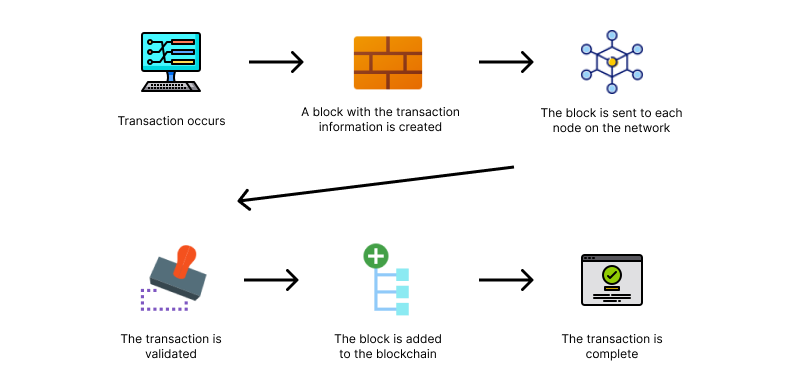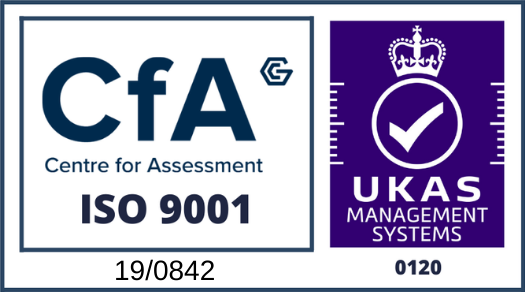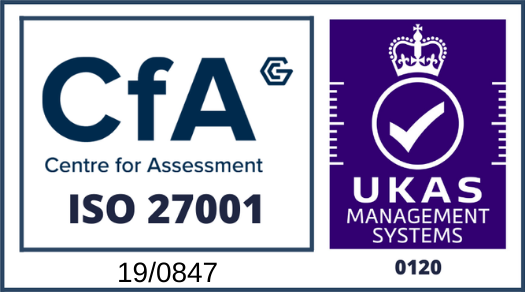At Audacia we're always interested in finding innovative solutions to problems. Where transparency and security are a client's main priority, we have been looking at blockchain as a way to safely store data.
Key Terms
Before getting into some of the possible uses of blockchain, it is useful to define some of the key terms that are associated with this concept.
IBM's definition: Blockchain is a shared, immutable ledger that facilitates the process of recording transactions and tracking assets in a business network. An asset can be tangible (a house, car, cash, land) or intangible (intellectual property, patents, copyrights, branding). Virtually anything of value can be tracked and traded on a blockchain network, reducing risk and cutting costs for all involved.
This initial research didn't get me any closer to understanding what a blockchain was. There were terms used such as a shared immutable ledger, blocks and nodes which I had heard being used before but not fully understood what their purposes were. Let’s breakdown what a shared immutable ledger is:
- Shared – meaning that it’s not privately distributed but instead anyone has access to it.
- Immutable – meaning that no participants can change or tamper with a transaction after it’s been recorded to the shared ledger. If an error were to occur — for whatever reason — a new transaction must be added to reverse the error and both transaction and error are then visible by everyone.
- A Ledger – a collection of immutable transactions that are recorded. With a shared ledger, transactions are recorded only once, eliminating the duplication of effort that’s typical of a traditional business network.
Putting all of these terms together, we can say that a blockchain is essentially an openly shared, read-only audit trail of things that have happened.
Understanding blockchains is like following a chain of terms in itself. The distributed ledgers are made up of blocks which, therefore, poses a new question: “What is a Block?”
A block is a piece of information which stores some data such as the date time, the order in where it sits within the chain and whether the transaction has been/is verified, along with custom data which is relevant to the blockchain's application.
The blocks are stored at each of the nodes, but “What is a node?”
A node is where an application runs on a piece of hardware. The job of a node can vary as there are different types. For example a ‘Full Nodes’ job is to receive, add transactions and sync potential new blocks of data from the other nodes on the network.
Nodes are what make up a network but “What is a network?”
A network is where two or more pieces of hardware are linked in order for them to share information between themselves.
Nodes are adding and receiving transactions, but “What is a transaction?”
A transaction is the event of creating a block, these show the movement of data whether the item which is moving from one location to another.
The below diagram shows what happens as a transaction is complete with blockchain.

For example, when a person hires a digger from an agricultural rental store, a transaction would occur; the person has taken the digger from the rental store to their site of work. Additional transactions would occur if the person wanted to extend the hire and/or when the person returns the digger to the rental store.
Industry Case Studies
With a basic understanding of the technology and some of it's key terms, we can now explore some of the industries which are taking advantage of blockchain.
Fashion
Within the luxury fashion market, the Global Brand Counterfeiting Report estimated nearly $100 billion in losses due to luxury counterfeiting. Being able to offer the ability for consumers to verify that their luxury fashion items are originals and authentic, gives consumers the ability to shop with confidence.
One of the main aspect of a blockchain is that it is transparent and immutable, which means that luxury brands have the ability to add blocks containing the information such as where their items are produced, the materials that were used in making of the product, where those raw materials were sourced and then make this information available to consumers.
Alexander McQueen is one brand utilising this technology. The brand relaunched its younger renegade brand McQ in 2020 with the key aspect of providing transparency to their customers. They added to their labels a QR code which customers can scan to find out about the origins of the fabrics used during a piece’s manufacturing, when it was manufactured and the quantity produced - all contributing to their commitment to sustainable luxury fashion.
Healthcare
In developing countries it is estimated that 1 in 10 drugs are fake reported the World Health Organisation in 2017. Based on the 10% estimates from WHO, the University of Edinburgh estimated between 72,000 to 169,000 children may die from pneumonia due to below par and falsified antibiotics.
Another study from the London School of Hygiene and Tropical Medicine estimated 116,00 (64,00 to 158,000) additional deaths from Malaria could be caused every year by below par and falsified anti-malaria's in sub-Saharan Africa, with a cost of $38.5 million to patients and health providers for further care due to non authentic drugs.
The healthcare industry has historically been slow in adopting newer technologies. Recently there have been many new startups which are taking advantage of the blockchain technology including:
- Ever - developed a EHR (Electronic Health Record) which is connecting over 170 hospitals and 5 million patients across Thailand.
- Patientory - developed a platform for organizations to provide transparency and privacy on individuals medical data with how is it been used and who is using it.
- Curisium - developed a platform for medical contract management and rebate negotiation. Curisium was acquired by HealthVerity in 2020 for an undisclosed fee, however they received $3.5 million in 2017 in seeding financing from Flare Capital Partners, proving that there is a lot money being spent in Healthcare to try take advantage of blockchains.
Supply Chain
Blockchains seem like they were made with the supply chain industry in mind. They have the ledger aspect to record enormous amounts of movements, give transparency at each stage and the security mechanism to prevent tampering.
This would allow businesses to reduce their paperwork and administrative costs, lower losses from counterfeits, increase their visibility of compliance over outsourced manufacturing, improve creditability and public trust of data shared.
Blockchains within the supply chain market is relatively new and adoption in larger corporations will take time due to their size in planning, developing and implementing the solution to use the technology. However there are many startups using the technology:
- Everledger - is a technology company which has an aim of reducing fraud in open market places. They are using the blockchain technology to track items like diamonds, gemstones and batteries.
- Migros - the largest Swiss supermarket brand has implemented a blockchain solution for their fresh fruit and vegetable products in a bid to reduce costs and food waste.
- Provenance - a UK-based startup which are using the technology to trace food. They have previously piloted tracing tuna in the Southeast Asian supply chain to give customers the confidence that the tuna they are purchasing and eating has been responsibly sourced.
Endless Possibilities
Blockchain has the ability to change the world in so many different sectors, to change the way we spend our money, how companies manufacture and distribute their products, how digital information is stored and shared and tracking tangible and non-tangible assets - with the aim of providing transparency and security, the possibilities of blockchain are endless.
At Audacia, we are currently exploring how to implement a blockchain using .NET 6 and EF Core 6 to see how we could potentially provide this option to clients. In the next part of this series on blockchain, we will walk through some of the key challenges we faced while implementing a blockchain and how we architected the solution.
Audacia is a software development company based in the UK, headquartered in Leeds. View more technical insights from our teams of consultants, business analysts, developers and testers on our technology insights blog.
Technology Insights

